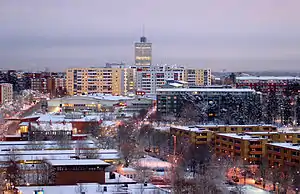

Husby is a district (Swedish: stadsdel) in Rinkeby-Kista borough, Stockholm, Sweden.[1] Husby has 11,551 inhabitants as of December 31, 2007.[2]
Husby is located on the blue Metro line. The main construction of modern Husby, with its multi-level concrete apartment buildings, started in 1972 as part of the Million Programme. The subway station was opened in 1977 and the train takes approx. 20 minutes to Stockholm City. The name of the suburb was taken from a former royal farm, still located in the area. The streets of Husby are named after cities in Norway. There are many runestones in the surroundings of Husby, remnants from when Vikings used to live here.
Husby has the lowest income per capita of any district of Stockholm.[3] In 2014, more than 80% of the population had minority background, mostly from Middle East and Africa.[4]
In its December 2015 report, Police in Sweden placed the district in the most severe category of urban areas with high crime rates.[5]
On 30 December 2016, shopkeepers decided to close their businesses from 1300 onwards due to the high number of robberies and burglaries targeting them.[6]
In 2017, local authorities decided to hire security guards to help the businesses, but no private security company wanted to take on the job.[7]
According to Finnish public service broadcaster Yle, in 2018, economist Takaaki Mitsuhashi from Japan described his visit to Husby: "whatever it was, it wasn't Sweden. We don't want those developments in Japan".[8]
2013 riots
In May 2013, the district was the center of worldwide attention, due to riots that spread to several other parts of Stockholm. Over the course of three days, approximately 129 cars were burned, garages were set on fire, and the rioters engaged in sporadic clashes with the police.[9]
Notable people from Husby
See also
- Husby metro station
- Vulnerable area - socially deprived areas in Sweden
References
- ↑ "Administrative divisions of the City districts". Stockholms stads utrednings- och statistikkontor. 2008-04-14. Archived from the original on 2007-09-23. Retrieved 2008-06-03.
- ↑ "Områdesfakta Husby stadsdel". Stockholms stads utrednings- och statistikkontor. Archived from the original on 2011-07-23. Retrieved 2008-06-08.
- ↑ Statistisk årsbok för Stockholm 2015 (PDF) (in Swedish and English). Vol. 108. City of Stockholm. ISBN 91-89311-01-9. ISSN 0349-4314. Archived from the original (PDF) on 2015-09-24. Retrieved 2015-01-07.
- ↑ Peter Saltin. "Detaljerad statistik" [Detailed statistics]. Statistik om Stockholm [Statistics about Stockholm] (in Swedish). Archived from the original on 2013-12-08. Retrieved 2015-01-07.
- ↑ Utsatta områden - sociala risker, kollektiv förmåga och oönskade händelser (PDF). Police in Sweden - Nationella Operativa Avdelningen. December 2015. p. 29. Archived from the original (PDF) on 19 August 2016.
- ↑ "Butikerna i Husby stänger i protest". SVT Nyheter (in Swedish). 2016-12-30. Retrieved 2018-08-17.
- ↑ Linda Dahlin (2015-08-15). "Vaktbolag ratar Husby – upphandling försenas". Mitt i Stockholm (in Swedish). Retrieved 2018-08-17.
- ↑ Thunqvist, Jon (12 August 2018). "Japan välkomnar fler utländska arbetare, men kritiker nämner Sverige som varnande exempel: "Utlänningarna är välkomna, men jag vet inte om de passar så bra att stå i butiker"". Yle. Retrieved 13 August 2018.
- ↑ Richard Orange (2014-05-25). "Swedish riots spark surprise and anger". The Guardian. Retrieved 2014-05-30.